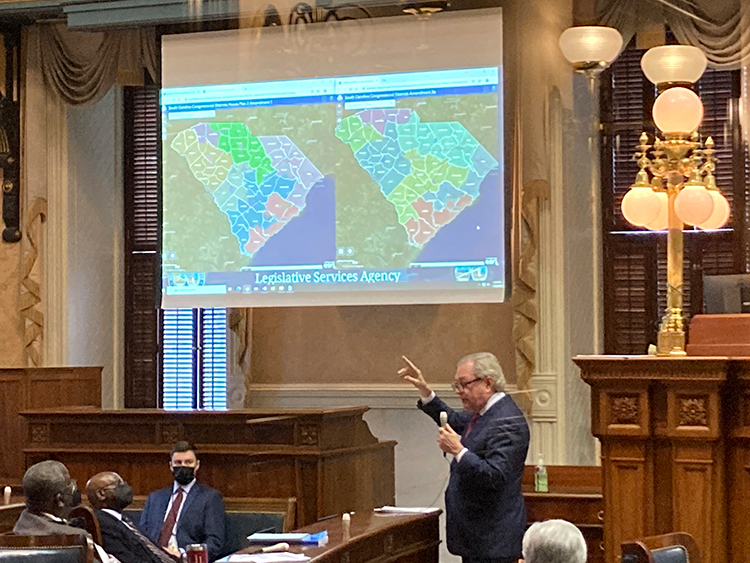Did court fail to 'disentangle race from politics' when it overturned voting map? SCOTUS to decide

South Carolina State Sen. Dick Harpootlian, D-Columbia, compares his proposed map of U.S. House districts drawn with 2020 U.S. Census data to a plan supported by Republicans. Leading GOP lawmakers will be taking their case to the U.S. Supreme Court to avoid redrawing the map that a three-judge federal panel deemed unconstitutional in January. (AP Photo/Jeffrey Collins, File)
The U.S. Supreme Court will hear an appeal to a decision striking down a redrawn South Carolina congressional district for discriminating against Black voters.
The court on Monday noted probable jurisdiction in the case, which involves mandatory rather than discretionary jurisdiction, SCOTUSblog reported in a preview.
A three-judge panel had ruled in January that South Carolina lawmakers violated the equal protection clause of the 14th Amendment when they moved Black voters out of the state’s Congressional District 1 to meet a racial target of 17%, producing a “Republican tilt.”
The appeal cites “a host of issues,” including whether “the district court erred when it failed to disentangle race from politics,” according to the Election Law Blog, which cited information from the lawmakers’ brief opposing the motion to affirm.
The plaintiffs who challenged the redrawn map were the South Carolina State Conference of the NAACP and an individual voter, Taiwan Scott, according to an American Civil Liberties Union press release and earlier coverage by the Post and Courier posted by the Election Law Blog.
Adriel I. Cepeda Derieux, deputy director of the ACLU’s Voting Rights Project, said in a statement that the redrawn district was “a textbook racial gerrymander and discriminatory map.”
“The facts and law are clear,” Derieux said. “South Carolina mapmakers brazenly moved Black voters in disproportionate numbers out of the Charleston County-anchored Congressional District 1 in order to hold on to political power.”
The plaintiffs were represented by the American Civil Liberties Union, the ACLU of South Carolina, the NAACP Legal Defense and Educational Fund, and Arnold & Porter Kaye Scholer.
Write a letter to the editor, share a story tip or update, or report an error.


